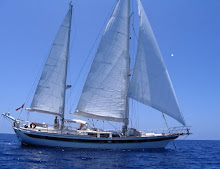By Scott Dodgson
There are two great forces on the ocean the wind and the Captain’s will. Taking a line from Captain Jack Aubrey in the great historical fiction series by Patrick O’Brian, “There is not a moment to lose.” The Captain drives the crew and his vessel to one purpose moving forward to the next port. “… not a moment to lose” serves not only as a mantra to everyday discipline on board but supports the bulwark of faith and discipline in the Captain’s leadership. Those crew members who lack their own inherent will and question the Captain’s goal of a safe passage will fall prey to their fears and short comings as citizens and men to jeopardize the vessel when rough seas and foul winds pose the obstacles to success and safety. We spent three days with fair weather and calm seas. With nothing more to do than stare at the horizon and record our progress in the log book I learned a great deal about my crew members. I must note that I as a Captain do remain guarded when discussing my life or psychology preferring to communicate with stories and parables to imply lessons learned and failed with the hope that even a mildly perceptive person will get the gentle message. Unless you are in military structure people bristle at being ordered to do something. To successfully accomplish molding a modern crew that listens and obeys without hesitation, the Captain must let it be known that his will and security is their will and security. It was apparent very soon after we left Antigua why Mike my first mate was the last man standing in English Harbor. He was an inciter. An inciter is a gadfly whose sole purpose in life is to create conflict and doubt in authority, no matter how kind and gracious that authority may be. His sailing competency was average, but his social skills excellent; unfortunately he had begun his inciting with David my charterer/club sailor. David was in his early fifties and had received an early retirement from a large chemical company. His sole purpose for making the passage was to test his mettle. Through my observations and over hearing hushed conversations, I sensed Mike was sowing doubt in David about his safety on board. David was an office man who slid through his working career by keeping his head down and allowing the natural attrition of other employees to aid his advancement. I have to give him credit for taking on an adventure of this difficulty, but in retrospect he made a foolish decision. I countered Mike’s political moves by teaching him as much about navigation and ocean sailing with the hope he would gain a new found respect for the knowledge. It was not to happen. Mike took the knowledge and became more emboldened in his perfidious plan. An unconscious plan I might add. It was just his nature. Paul the other charterer/club sailor was quiet and consciousness man in his early thirties. His purpose for being on this crossing was to give him something to talk about with his father and grandfather who apparently had many sailing adventures. I suspected he was disappointed by the three days of uneventful sailing, beautiful sailing. Janice, elderly chef seemed right at home and cooked us some great meals no easy task given the vessel’s natural pitch and rolling. However I did notice one problem with Janice. My wine supply seemed to be disappearing rather quickly not from the front of the rack but from the back! At two in the morning I was fixing a coffee when I heard a change in the sound of the rigging. I dropped my cup in the sink and run on deck. Mike was asleep on watch and the autohelm had turned off and we were floundering. Worse yet, the wind was starting to pick up velocity. With a full moon rising in the east and turbulent angry clouds racing overhead the moon was soon lost above the deepening cloud cover. I quickly set the course and engaged the autohelm. Mike was apologizing profusely, but I would have none of it. Now was the time for action and seamanship. It was time to bend the will of the wind to the will of the crew. We dropped the 150 Genoa and replaced it with the normal 100 Genoa. I reefed the main and the mizzen. This was all tough work requiring we be attached with safety harness. The remainder of the crew came on deck and helped where they could. I give a quick succession of orders which the crew executed flawlessly. In the dim light of the cockpit, I surveyed the faces of my motley crew. Their doubt was replaced by confidence. Once my boat had gained her legs and was running before a freshening twenty-five knot wind and rising seas, I explained this is the reason you are here.
Subscribe to:
Post Comments (Atom)

No comments:
Post a Comment